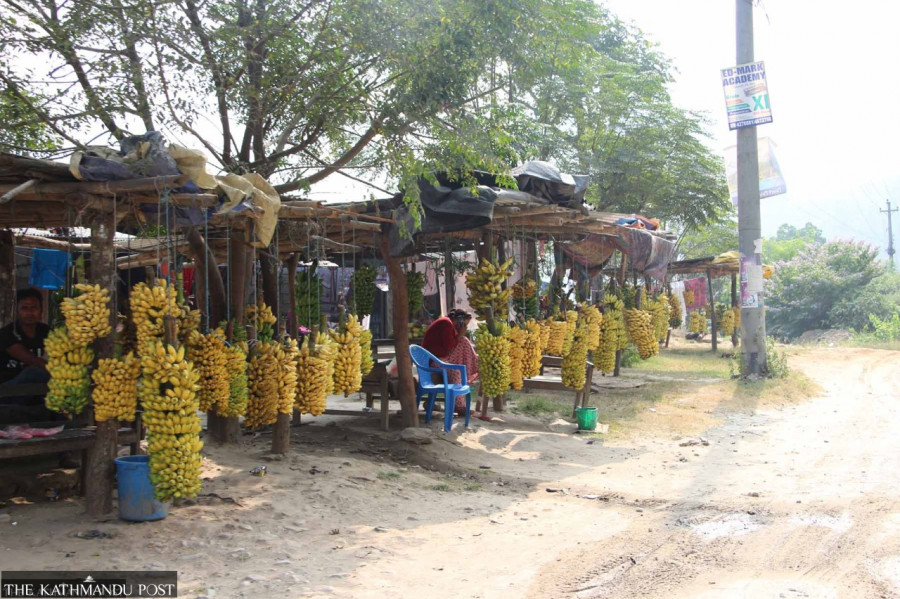
Investors and traders bemoan that it is difficult to get loans even in the productive sector as banks face a liquidity crisis. Post File Photo
Prakash Rajbahak is finding out that trouble comes in bunches. No sooner had the Covid pandemic ebbed than inflation emerged to upset him.
Inflation is soaring, hitting everyone but in different ways. Rising prices are a bigger burden on low-income households that are largely hand-to-mouth consumers.
“It’s so costly...everything,” said Rajbahak, 47, who works for a private company. He and his wife together earn Rs50,000 per month, which is barely enough for his family of five to scrape by.
Nepal's retail inflation galloped to a 67-month high of 7.14 percent in March, well above the central bank’s upper tolerance due to a sustained rise in food prices.
It is not only the people who are suffering because of high inflation, the economy is having a hard time too, according to economists.
Why is inflation rising? One of the reasons is the Russia-Ukraine war.
According to a World Bank report titled "South Asia Economic Focus Reshaping Norms: A New Way Forward" released on Wednesday, higher commodity prices in Nepal are spurred by the war in Ukraine.
Transportation prices, construction costs and other consumer prices are rising which will dampen overall demand, the report said.
This may shave Nepal’s economic growth by an estimated 0.2 and 0.6 percentage points in the current fiscal year 2021-22 and the next fiscal year 2022-23 from previous projections, the multilateral funding agency said.
With the Russia-Ukraine war raging on, the World Bank has revised Nepal’s growth projection too.
Nepal’s economy, led by recovery of the services sector amid high Covid vaccination rates, is expected to grow by 3.7 percent in the current fiscal year and 4.1 percent in the next year.
But Finance Minister Janardan Sharma and company, apparently oblivious to Nepal’s economic situation, have been making unsubstantiated statements that the country would achieve 7 percent growth, which economists say is far-fetched.
Growth is projected to be slower than previously estimated, mostly due to the impact of the war in Ukraine, says the World Bank in its regional update.
Limited spending consolidation could also result in reduced capital spending to compensate for persistent elevated recurrent spending, which could depress growth further.
Economists say higher inflation is still going to cause a lot more stress for lower-income families in the days ahead, and also the recovery of the job losses during the pandemic.
“Amid global challenges, Nepal is on a path to slower albeit continued gradual recovery,” said Faris Hadad-Zervos, World Bank Country Director for Maldives, Nepal and Sri Lanka, in a statement issued on Wednesday. “Leveraging Nepal’s massive hydropower production potential, and a revival of tourism are key elements that support an optimistic outlook.”
According to the report, Nepal’s direct trade with Russia and Ukraine is small, but higher global commodity prices are expected to increase the costs of fuel, agricultural products, metal and mineral imports. These higher prices are expected to widen the current account deficit, reduce the growth rate and increase inflation.
Services exports are expected to be less affected given the relatively low share of tourist arrivals from these two countries, the report said.
But on the bright side, according to the report, higher fuel prices may lead to stronger demand for migrant workers in the oil-exporting Gulf Cooperation Council (GCC), a political and economic alliance of six Middle Eastern countries—Saudi Arabia, Kuwait, the United Arab Emirates, Qatar, Bahrain, and Oman. Increased labour demand would consequently push up remittance earnings.
Overall, taking into account the impact of the war, the Nepali economy is expected to recover gradually.
Nepal’s trade with Russia and Ukraine accounts for less than 2 percent of total imports, which consist mostly of sunflower oil, dried peas and colza seeds. But the import of fuel, agriculture, metals and minerals accounts for a large share of total imports.
“As such, Nepal is less likely to face an immediate negative supply shock because of the direct trade linkage. Instead, higher global commodity prices are expected to increase the import bill indirectly,” according to the report.
The World Bank said that recovery of tourism and services exports remain muted, job losses have been extensive, and buffers have been reduced to meet large financing needs.
The government has done an admirable job providing vaccinations to a large swath of the population, but more can be done on economic reforms to stimulate the domestic economy, it said.
Encouraging foreign direct investment (FDI) inflows, currently the lowest in the region, would not only support foreign exchange reserves but also make the private sector more competitive through skill transfers and know-how.
“Hence, a more dynamic and competitive private sector will boost production for both domestic and external markets and create jobs. FDI has the added benefit of not adding to the country’s debt and reducing pressure on foreign exchange reserves, thus mitigating the risks that further import and capital flow restrictions could have on growth.”
While imports have ballooned like never before, Nepal has started taking unpopular moves by barring traders from opening letters of credit to import luxury goods, mostly vehicles and cosmetics. Investors and traders bemoan that it is difficult to get loans even in the productive sector as banks face a liquidity crisis.
For people like breadwinner Rajbahak, a rise in the prices of daily needs like edible oil, vegetables and lentils and his children’s school fees causes him pain.
"Dearer fuel prices have made the daily commute harder," he said.
“Prices are going up in an uncontrollable way,” said economist Govinda Nepal. “Inflation has breached the central bank’s tolerance limit.”
And more inflationary pressures are ahead.
“As cash will flow to the local level in the May elections, it will increase demand, and traders will hike the prices of consumable goods,” said Nepal.
“The sharp rise in inflation will impact access to nutritious food for children, hit daily wage earners, particularly those in the informal sector and those working on a low salary base.”













